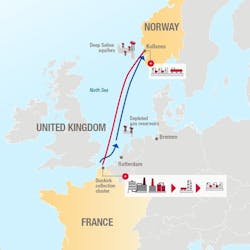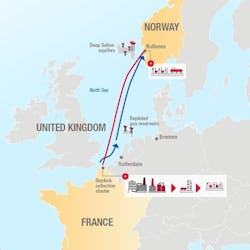A consortium of 11 European stakeholders including ArcelorMittal, Axens, IFP Energies nouvelles (IFPEN), and Total SA, has launched a project to demonstrate an innovative process for capturing carbon dioxide from industrial activities.
The so-named DMX project is part of a more comprehensive study dedicated to the development of the future European Dunkirk North Sea carbon capture and storage (CCS) cluster.
The 3D project (DMX Demonstration in Dunkirk) is part of Horizon 2020, the European Union’s research and innovation program. The project has a €19.3 million budget over 4 years, including €14.8 million in European Union subsidies.
Coordinated by IFPEN, the 3D project brings together 10 other partners from research and industry from six European countries: ArcelorMittal, Axens, Total, ACP, Brevik Engineering, CMI, DTU, Gassco, RWTH, and Uetikon.
The objective is threefold:
• Demonstrate the effectiveness of the DMX process on a pilot industrial scale. The Axens-designed pilot—able to capture 0.5 tonnes/hr of CO2 from steelmaking gases by 2021—will begin construction in 2020 at the ArcelorMittal steelworks site in Dunkirk. The solvent used in the DMX process reduces the energy consumption for capture by some 35% compared with the reference process. Additionally, using the heat produced on site will cut capture costs in half, to less than €30/tonne of CO2.
• Prepare the implementation of a first industrial unit at the ArcelorMittal site in Dunkirk, which could be operational starting in 2025. It should be able to capture more than 125 tonnes/hr of CO2 (over 1 million tpy of CO2).
• Design the future European Dunkirk North Sea cluster, which should be able to capture, pack, transport, and store 10 million tpy of CO2 and should be operational by the year 2035. This cluster will be backed up by the packing and transport infrastructures for storing CO2 in the North Sea developed by other projects such as the Northern Lights project (OGJ Online, Nov. 30, 2017). The first phase of this project will provide storage for as much as 1.5 million tpy of CO2 captured from onshore industrial plants in eastern Norway and transported by ship to the onshore terminal.
“Commercial-scale pilots, such as Dunkirk’s, are vital to make carbon capture, utilization, and storage technologies more competitive, supporting the growth of low-carbon industry,” said Marie-Noelle Semeria, senior vice-president and group chief technology officer at Total.

